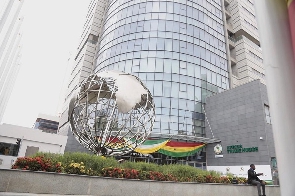- Home - News
- TWI News | TV
- Polls
- Year In Review
- News Archive
- Crime & Punishment
- Politics
- Regional
- Editorial
- Health
- Ghanaians Abroad
- Tabloid
- Africa
- Religion
- Election 2020
- Coronavirus
- News Videos | TV
- Photo Archives
- News Headlines
- Press Release
Opinions of Monday, 9 November 2020
Columnist: goldstreetbusiness.com
Ghana faces up to specific AfCFTA opportunities, threats
The commencement of the world’s largest single market – measured by population not by economic value – has been a long time in coming.
Kwame Nktumah the first president of sub Saharan Africa’s first politically independent nation, Ghana, had proposed it and indeed worked towards its actually being formed, over 60 years ago.
Even when it finally took concrete form, the global coronavirus pandemic threatened it in a totally unforeseen way. But being a concept whose time has come COVID 19 could not do more than to cause a final six months delay; The Africa Continental Free Trade Area AfCFTA, goes live on January 1, 2021, barring any further spanners thrown into the works, which is unlikely but not altogether impossible.
Fittingly, Ghana, the country that first proposed the concept, well over half a decade ago, is host to the secretariat charged with implementing and managing the underlying agreement which also goes by te acronym AfCFTA and is thus interchangeably with the single market itself.
Ghana’s hosting of the secretariat is not just fitting because of history; the country is also one of the most enthusiastic supporters of the single market today, but unlike 60 years ago, for entirely economic reasons, rather than primarily for political reasons. Ghana has envisioned itself as an economic hub for West Africa for several decades and now it has the opportunity to play this role for the entire continent.
Playing host to the AfCFTA secretariat is a pivotal pillar on which Ghana can strive to become a financial centre and a transportation hub for Africa. This is in addition to its intended positioning as one of the biggest intra-African exporters.
Instructively, nearly half of Ghana’s nearly US$3 billion in annual non-traditional exports are sold to fellow member states of the Economic Community of West African States, ECOWAS, which has allowed duty free trade between members of goods made locally, for more than two decades.
With AfCFTA, Ghanaian manufacturers and exporters can now look even further afield. This is key not just because Ghana’s relatively small domestic market of less than 30 million people is a limiting factor for investment that wants to benefit from economies of scale; under ECOWAS, the largest single market, Nigeria is sometimes closed to other countries Ghana inclusive, without warning, in blatant violation of ECOWAS protocols. This means Ghana’s potentials for export under ECOWAS protocols never get fully realized, a major frustration for both Ghana’s government and its private sector.
With AfCFTA however, several other major duty free export markets will become available, such as South Africa in the southernmost part of the continent, Kenya to the East and Egypt to the north.
Despite their own numerous shortcomings the many export markets, now opening up to Ghana have much better track records of adhering to multilateral agreements than Nigeria..
But even as Ghana’s top trade officials repeatedly trumpet the potentials of AfCFTA to the country’s private sector and promise their full support, little has been done in practical terms in this regard.
It is instructive that no government trade institution or agency has made public an indepth analysis of which type of Ghanaian products stand to be price and quality competitive in which African jurisdictions under AfCFTA’s terms; and even more importantly quantitatively showing how much more competitive each type of Ghanaian non-traditional export will become in each African country, against similar products from each country’s traditional sources of imports, because of the preferential treatment Ghanaian exports will now enjoy.
This means potential Ghanaian exporters are being left to their own devices with regards to identifying potential new markets across Africa where they can be competitive.
But even in Nigeria, one of the last countries to sign up to AfCFTA membership – and reluctantly at that – the government has collaborated with trade research institutions to provide its private sector with maps that provide such crucial information.
This is allowing potential exporters from Nigeria to concentrate their time and resources on using the information as a foundation on which to devise strategies for winning the best available new markets around the continent.
But members of corporate Ghana, ever resourceful, are identifying potential markets themselves. Here, their starting point is the structure of their non-traditional exports under the ECOWAS Trade Liberalization Scheme, which is supposed to grant them duty free access to markets in West Africa.
Under this markets identification strategy, it is assumed that products Ghana is internationally competitive in within West Africa are products that the country can equally be competitive in elsewhere around the continent; until data or qualitative analyses reveal otherwise for one reason or the other – perhaps higher transport costs would make Ghanaian products price uncompetitive; or perhaps an export market is already too closely controlled by certain competitors from elsewhere; or perhaps a country’s culture simply makes certain types of Ghanaian products unwanted.
So far though, strong potentials are being identified in a number of products. Perhaps the most obvious is chocolate, and other cocoa based products such as cocoa beverages, which Ghana has curiously failed to market globally despite having huge competitive advantages.
But there are lots more.
Unsurprisingly, the Ghana Export Promotion Authority has come closest to providing the requisite markets information for Ghanaian enterprise to identify markets, although this is done on a global rather than Africa –specific basis.
The shortcoming here is that some products, which have proved highly successful with regards to export markets in , say Europe, Asia and the Americas might not be competitive within Africa because several other African countries produce the same products themselves and indeed provide the biggest competition for Ghana’s exports in those non-African markets.
This means that even with GEPA’s research contributions Ghana’s private sector still has lots of research to do with regards to identifying market opportunities in Africa.
Basically, GEPA, through its strategic plan for expanding Ghana’s NTE sector identifies products already doing well in export markets and also identifies products that have the best potential for export growth, even though they are not necessarily among the biggest export products yet. This, at least, provides a foundation upon which Ghanaian enterprises can begin their market research with regards exploiting AfCFTA.
Ghana’s best selling NTEs currently are: processed cocoa products; processed and in-shell cashew; horticultural products; processed oil seeds, fish and fishery products; garments and apparels; natural rubber sheets; aluminium products; articles of plastic; services. Potential exporters under AfCFTA terms however will now have to find out which of these have demand in Africa and whether Ghana is competitive against other African countries.
Then there are the products which GEPA categorizes as strategic anchor industrial products. Actually, these have better prospects than the high performing ones, which are more centred on exports to developed economies such as Europe. Indeed the list of strategic anchor products is in part based on opportunities under AfCFTA.
These are pharmaceuticals,; aluminium products,; iron and steel products; automobiles and vehicles; garments and textiles; industrial salt; and petro-chemicals.
Since these are the producers targeted by government to lead its NTE growth this is where exporters can expect the best state support particularly through Ghana Export Import Bank which is proving to be far and away the biggest supporter of government’s international trade agenda and the industrialization efforts that underpin it.
Next though is the identification of the specific African markets which Ghanaian manufacturers and exporters should target. Since the stste has failed to provide this information they should turn to the African Union itself which is currently piloting a new initiative which wiil provide a lot of the information now needed.
This is the African Trade Observatory. The development of the impending new portal, which is now at its pilot stage, is supported by the European Union and the International Trade Centre, and is billed to play a crucial role in the implementation of the African Continental Free Trade Area (AfCFTA)
The new online tool, designed to help businessmen and businesswomen in Africa understand how best to trade between African countries came a step closer to becoming fully operational in August 2020, as a demonstration version came onstream. Ghanaian trade regulators and a few captains of commerce who have seen the demonstration since then claim to be very enthusiastic as to its capacity to provide them with crucial information
The African Trade Observatory (ATO) has since begun testing the online dashboard to give real-time trade statistics to African users.
Such information will include intra-continental trade flows (traded values, traded quantities, the use of tariff preferences, taxes and fees paid at the border), and information on market conditions (such as taxes applicable at the border and regulatory requirements).
The transfer of raw data from providers to the ATO team will be automated where possible to make the collection of quantitative information sustainable.
The portal will be divided into three modules to allow users to:
Compare trade opportunities in Africa
Explore market access conditions of African partners
Monitor the implementation process and achievements of the AfCFTA and the Boosting Intra African Trade Action Plan.
Members of the ATO Steering Committee were presented with a beta version of the Compare and Explore modules in August 2020. These two pillars of the ATO Dashboard have been designed to support micro, small and medium enterprises in Africa to simplify their market research.
A first set of live demonstrations were organized in September and highlighted how users can compare challenges and opportunities of the African markets, and explore market access conditions and business partners to expand their business within the continent.
As the hosts of the headquarters of AfCFTA, Ghanaian stakeholders have been given extensive access to the workings of the ATO and consequently the private sector is now preparing strategies for how best to make use of the information in will provide on a regular basis when it becomes fully operational.
But while Ghana may be having shortcomings with regards to identifying the markets it can exploit, the government is not short of effort towards boosting the competitiveness of corporate Ghana and its productive capacity.
Minister of Trade and Industry, Mr Alan Kyeremanten, points out how the Government of Ghana iss enhancing industrial productive capacity through the one district one factory initiative, the one region one industrial park initiative, mirroring Asian economic zones, and a rigorous plan to maintain acceptable standards of products and services.
To further position Ghana to fully maximize the trade area, Mr Kyeremanten notes that the Government is also enhancing trade facilitation through custom reforms and the port expansion programme and providing access to finance for local industries who will be charged with exports when the AfcFTA kicks in.
Interestingly, while the focus in Ghana has centred on exploiting potential export markets very little attention has been given to using AfCFTA to source relatively cheap imports, both as inputs for industrial production and for finished consumer goods. This is ironic considering that if past experience is anything to go by, Ghanaian international traders will be more active in doing this than in trying to expand NTEs when AfCFTA commences in a couple of months.
Under the radar of public – and government’s attention however, Ghanaian importers are quietly doing their own research into possible sources of imports of both industrial inputs and finished goods from other African countries – that can be landed in Ghana at cheaper cost because they would not attract import duties- than alternatives from further afield.
This can actually count as yet another benefit for the Ghanaian economy but only as long as such products do not displace locally made goods from consumer goods shelves and the production input procurement lists in Ghana itself.
This is a distinct possibility – duty free entry of such products into Ghana provides the same kind of increased price competitiveness as Ghana’s exporters are trying to exploit in their sales elsewhere around Africa.
Ironically, the controversial Economic Partnership between ECOWAS and the European Union, in forcing Ghanaian domestic manufacturers to improve their own cost competitiveness so as to fend off competition from significantly cheaper goods from Europe, due to the tenets of that agreement have positioned themselves better to do the same with the impending stiffer competition from other African producers.
But even as Ghana gets ready for all this increased competition at home and enhanced competitiveness elsewhere across Africa, the country is also gearing up to take advantage of the impending new dispensation to become an economic hub for investors from all over the world looking to take advantage of the increased intra-continental economic activity which AfCTA will usher in.
“The AfCFTA should anchor Ghana’s plan to transform Ghana into a regional hub – aviation and logistics, education, healthcare, religion, manufacturing, petroleum and financial services” asserts the Chief Executive Officer of the GIPC Mr. Yofi Grant who points to the guaranteed opportunities, openness and optimism investors could expect in Ghana.
Mr. Grant highlights the incentives available to prospective investors and beseeches investors to Grow in Ghana and with Ghana.











